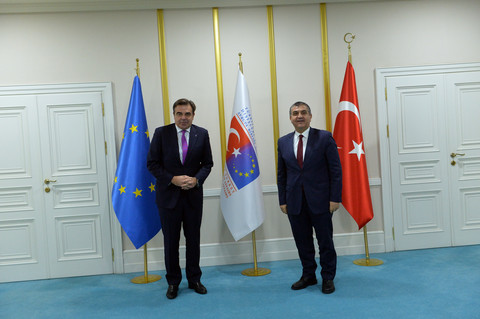Turkey remains sidelined for membership of the European Union even as other candidate countries continue to make determined, if fitful, progress toward membership.
And yet, among some of the most senior Turkish officials, there remains a strong determination to restart EU accession discussions – and even some optimism about one day getting them back on track.
-

Turkey is a member of Nato, although not an EU member – despite candidate status being granted back in 1999 (Photo: nato.int)
“Turkey’s EU accession perspective should be retained, and even further strengthened in the interest of both sides,” Faruk Kaymakcı, Turkey’s deputy minister of foreign affairs and director for EU affairs, told EUobserver. (see full transcript here).
These officials emphasise that rebooting prospects of joining the European bloc would entice Ankara to enact further reforms — although that’s a position some view with scepticism in light of president Recep Tayyip Erdoğan’s tightened grip on the state.
To be sure, regular contacts between Brussels and Ankara are ongoing on a wide range of topics despite the simmering tensions over Turkey’s autocratic drift and its frictions with EU member Greece. Kaymakcı’s comments follow high-level meetings with European commissioners on issues ranging from climate change to foreign policy held last year.
And some analysts in Turkey do see positive impacts domestically in keeping alive the accession objective.
“Firstly, being an accession country has implications for the domestic order,” said Sinan Ulgen, the chairman of the Istanbul based think tank the Center for Economics and Foreign Policy Studies. “It provides a more favourable environment for defending political and economic reforms at home,” Ulgen told EUobserver.
Turkey also gets “a range of privileges regarding its relationship with the EU that extends in many different domains and that have implications not only for the Turkish state, but also for Turkish citizens that live in the EU countries,” Ulgen said.
Yet the one overriding issue that continues to keep the EU and Turkey in a delicate dance over accession may be migration.
The EU wants Turkey to keep hosting some four million mostly-Syrian refugees as it reinforces its external borders, most recently with Belarus, and in the wake of the Taliban takeover of Afghanistan.
In exchange, the EU has dispersed over €4bn, out of €6bn contracted to mainly NGOs and international aid organisations working with the refugees in Turkey. The EU topped up its assistance last year with an additional €3bn until 2023, according to the spokesperson for the European Commission.
The money is part of the 2016 EU-Turkey statement, which included other proposals on visa-liberalisation, trade, and improving humanitarian conditions inside Syria.
Yet few of those proposals have been enacted amid increasing frustrations from Ankara, which wants the new additional funds to amount to a new deal that also tackles Syrian and Iranian issues.
“What we are repeatedly saying is that the new migration deal especially after the Afghan crisis, has to focus on cooperation and return of Syrians to northern Syria, cooperation on the Turkish-Iranian border, joint action in the source countries and fair burden-sharing in terms of financial support and resettlement,” Kaymakcı said in an email interview with EUobserver.
Kaymakcı welcomed the additional EU funds, but said the Turkish state has alone spent more than €40bn on the refugees. “Where is the fair burden-sharing?” he asked.
When it comes to readmission of migrants, Turkey had taken back 2,300 Syrians from the Greek islands but has balked at taking a further 1,000, as requested by Athens, sparking further tensions.
Kaymakcı says Greece first needs to return Turkish nationals it claims were part of the failed coup. It also wants Athens to shift its policy of declaring Turkey not safe for Turkish citizens but safe for irregular migrants.
“Unless Greece reverses its policy on these issues, Turkey will retain the current position and not take anyone from Greece,” said Kaymakcı.
Neither prospect is likely as Ankara uses tough language to press its point against its arch-rival in Athens – amid numerous reports of illegal pushbacks of asylum seekers from the Greek islands.
Kaymakcı is well versed on the issues. He was Turkey’s former ambassador to the European Union and had obtained a masters from the College of Europe in Bruges, whose alumni are found throughout the EU institutions.
‘Space rocket on Mars’
But the chances of Turkey ever joining the EU remain far-fetched – not least given the political mood, which nosedived in the wake of a failed military coup in July 2016.
“There is more chance of Elon Musk putting his space rocket down on Mars than there is of Turkey’s accession ever happening,” said Amanda Paul, an expert on Turkey from the Brussels-based European Policy Centre.
“Unless there was a major change of approach from president Erdogan and the AKP, I think it is impossible for very much to change in terms of the broader EU-Turkey relationship,” she said.
Ankara still has six outstanding criteria out of 72 it needs to finalise before Turkish nationals are allowed to travel to the EU without a visa.
Those EU criteria include everything from Turkey amending its anti-terror laws to data protection and cooperation with the EU’s police agency, Europol. In 2018, Kaymakcı described visa-liberalisation as a “low-hanging fruit.”
Now he appears to lay part of the blame on the delays at the door of the EU.
“Visa liberalisation dialogue is not a dialogue anymore since the EU side, DG Home Affairs, has not engaged with us for more than two years,” he said.
EU sanctions over gas drilling off Cyprus, and a clash that saw thousands of refugees and asylum seekers rush towards the shared land border with Greece in early 2020, have only exasperated relations.
Aside from patchy trade, plus a migration deal hammered out only weeks before the 2016 coup, not much else appears to be working between the two.
The point was reiterated by European ministers last December when they said “Turkey continues to move further away from the European Union”, adding that “Turkey’s accession negotiations therefore effectively have come to a standstill and no further chapters can be considered for opening or closing”.
23-year backstory
Turkey was granted candidate status in 1999, opening accession chapters in 2005. So far only 16 of 35 such chapters have been opened, and one on science provisionally closed.
The European Commission, in a report last year, also painted a bleak picture, accusing Turkey of democratic backsliding, squeezing out civil society and launching criminal cases against journalists, human rights defenders, and others.
“Our sole priority, as in many other democracies, is to strike a proper balance between maintaining public order and security and protection of the freedom of expression,” said Kaymakcı, when pressed.
He also took issue over the fates of jailed Turkish activists like Osman Kavala and Selahattin Demirtaş, who Amnesty International says should be released.
More recently, in mid-January, Turkey detained a journalist for reciting a proverb that was seen as an insult to president Erdoğan.
By NIKOLAJ NIELSEN
Source: EU Observer



